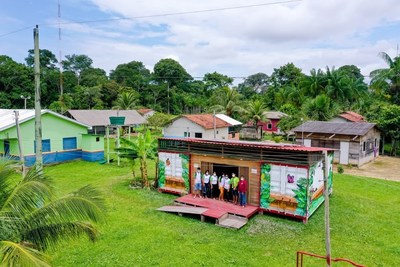Dell Technologies (NYSE:Dell), in partnership with Computer Aid, Intel and Microsoft, announced its Solar Community Hubs strategy, marking an evolution in its established Solar Learning Labs program. Moving beyond technology access for education alone, the hubs improve access to technology, healthcare and workforce skills for communities in remote areas around the world.
The Solar Community Hubs will be built with Dell technology-enabled solutions and look to introduce 5G, edge computing and other services. Each hub will be managed by the community and will offer services based on each community’s unique needs. The hubs will provide communities with access to water and electricity, healthcare and resources for environmental preservation. Community members can also access technical skills training, entrepreneurship support, education and career guidance, and revenue-generating services to support job creation and financial sustainability.
“Research shows that the greatest impact starts with empowering local communities,” said Cassandra Garber, VP of Environmental and Social Governance, Dell Technologies. “By introducing the Solar Community Hubs, communities will have access to resources and infrastructure to address their most pressing issues. This evolution puts community needs at the center, and we are eager to see – and be a part of – the impact these community partnerships will have around the globe.”
Digitizing the Amazon to Support Sustainability
Dell Technologies recently introduced the first Solar Community Hub in Boa Esperanca, Brazil, in partnership with the Foundation for Amazon Sustainability (FAS), bringing digital tools like Latitude Rugged, desktops, servers, projectors and Wi-Fi to community members in a dozen outlying riverside communities and Indigenous tribes in the Amazon. Community members, who previously traveled far for modern services and school, can now continue their education, take vocational courses, start college and prepare for the job market – in their own community.
The hub is also designed with circularity at its core, using repurposed shipping containers, sustainably sourced wood and furniture, and solar panels so devices run primarily on renewable energy.
Participants in the project are part of FAS’ Bolsa Floresta program, a government initiative of the State of Amazonas introduced in 2008 to decrease deforestation through community building. The hubs help improve the lives of people living in the Amazon who then cultivate a more sustainable relationship between the rainforest and its residents.
Power in Partnership
Dell currently collaborates with approximately 60 strategic partners globally, including Computer Aid, Dell’s nonprofit partner for Solar Community Hub development. Computer Aid helps identify the locations and local partners who can help make the hub a reality.
Since 2011, Dell and Computer Aid have partnered to support 24 Solar Learning Labs, which reach 18,000 students and community members per year in countries including Brazil, Colombia, Kenya, Mexico, Morocco, Nigeria and South Africa.
Dell also works with customers, partners– like Intel and Microsoft – and other stakeholders to bring additional resources and capabilities to the communities based on local needs. Partners and customers can now join Dell Technologies and Computer Aid in supporting the roll out of the Solar Community Hubs over the coming years.

